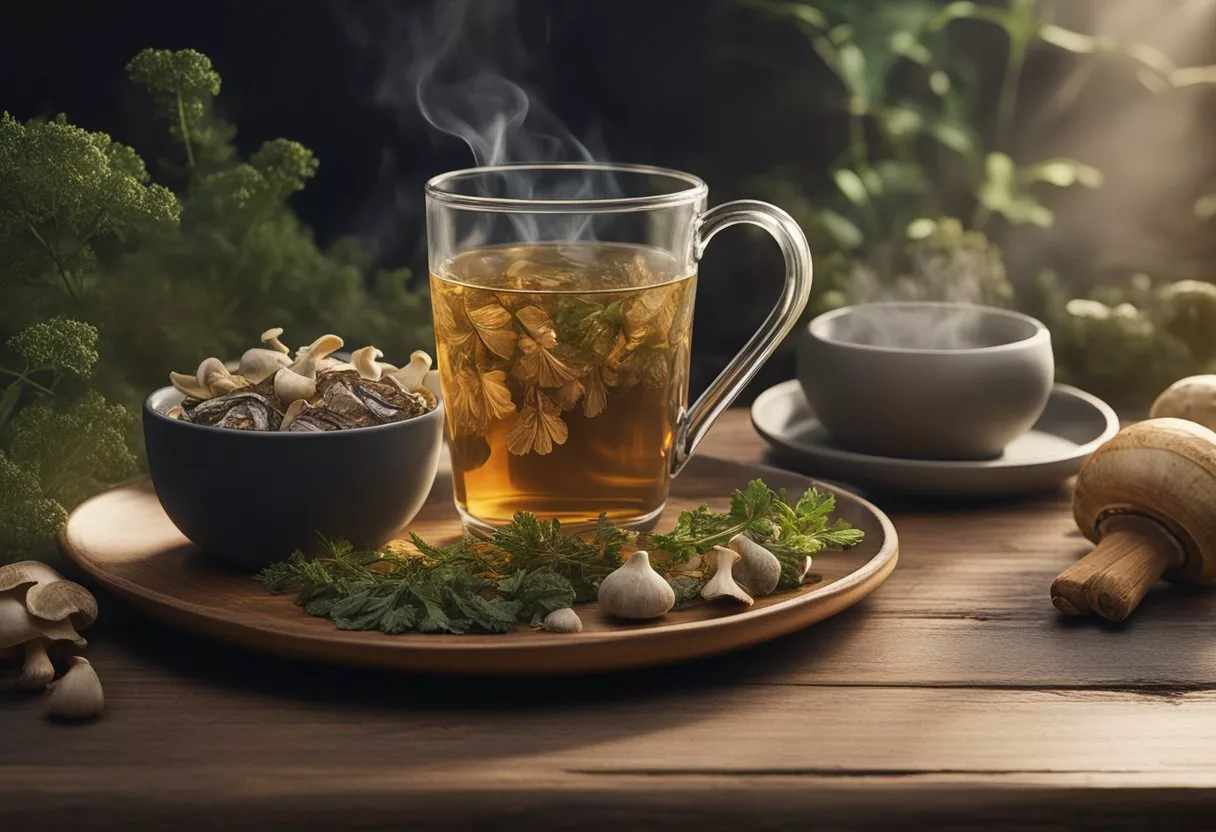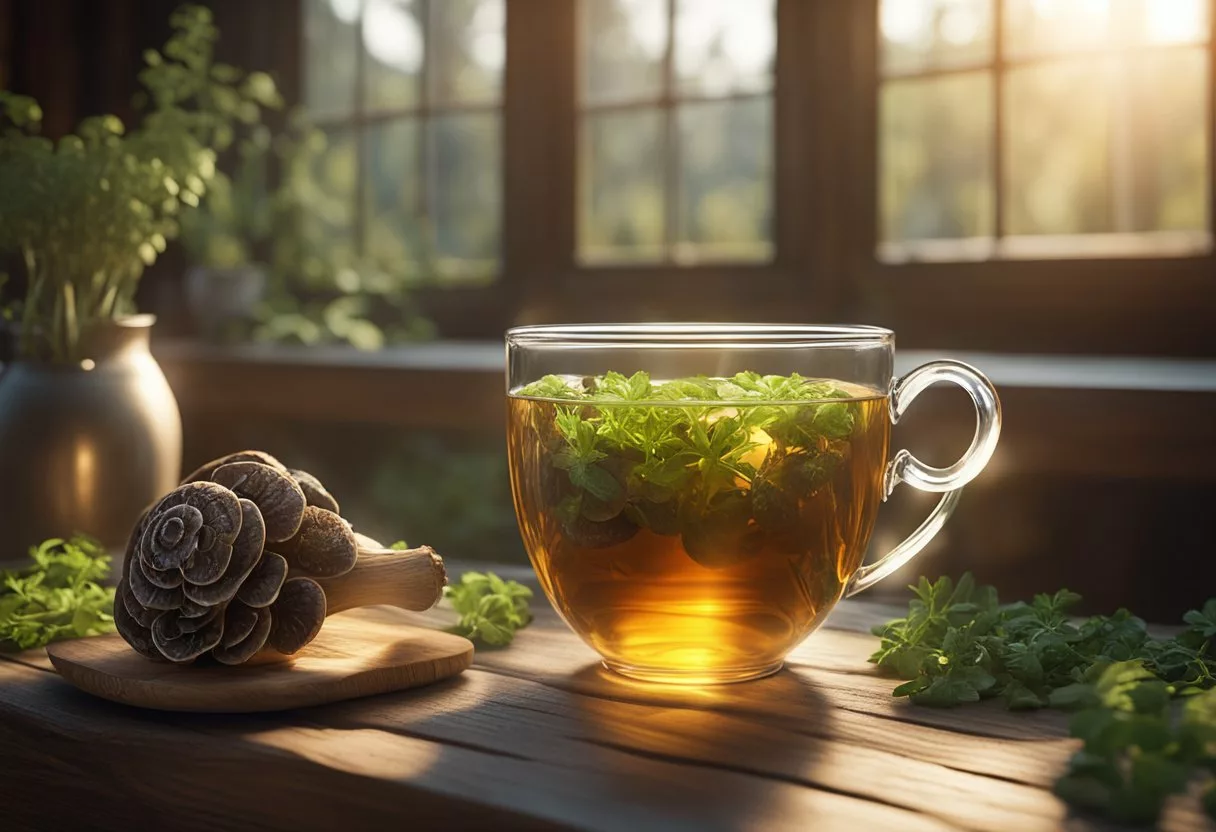Turkey tail mushroom tea has become well-known for its potential health advantages and its deep-rooted historical significance. This natural elixir is known for supporting immune health and promoting gut balance. Originating from the turkey tail mushroom, its colorful bands resemble a wild turkey’s tail, making it easily recognizable and a favorite among foragers.

Brewing turkey tail tea is straightforward and can be done using fresh, dried, or powdered mushrooms. It combines well with ingredients like honey, ginger, and lemon for added flavor and benefits. Whether you’re seeking a daily wellness boost or looking to integrate a new natural remedy into your routine, turkey tail tea offers a flavorful and beneficial option.
Exploring turkey tail tea further, you’ll discover various preparation methods, potential side effects, and ways to enhance its efficacy. This tea fits well into a balanced lifestyle, offering a unique combination of taste and therapeutic properties.
Key Takeaways
- Turkey tail mushroom tea supports immune health and gut balance.
- It can be made using fresh, dried, or powdered mushrooms.
- Integrates well with ingredients like honey, ginger, and lemon.
Origins and History

Turkey tail mushroom, also known as Trametes versicolor, has a rich history that spans across continents. This mushroom has been used for centuries, especially in traditional Asian medicine, and has made its way to North America and Europe.
Traditional Use in Asia
In Asia, turkey tail mushroom has long been prized for its medicinal properties. In China, it is known as “Yun Zhi” and has been used in traditional Chinese medicine for over a thousand years. Practitioners believe it boosts the immune system and supports overall health. The mushroom is typically brewed into a tea or used in powder form.
Japan also regards turkey tail mushroom highly, where it is called “Kawaratake.” It is often used in Kampo, a traditional Japanese medical system. Researchers in Japan have studied its potential anti-cancer properties, making it a subject of modern scientific interest as well.
Korea has its own history with turkey tail mushroom, utilizing it in various health tonics. It is commonly combined with other herbs to create potent medicinal formulas. These traditional uses have laid the foundation for its modern applications in the West.
Spread to North America and Europe
Turkey tail mushroom made its way to North America and Europe through both migration and trade. As people moved and settled in new regions, they brought their traditional medical knowledge with them. In the 20th century, scientific interest in alternative medicine led researchers in these regions to begin studying turkey tail mushroom.
In the United States, it gained popularity among those seeking natural remedies. The mushroom is now widely available in health food stores and online, often in the form of tea, capsules, and powders. It has entered mainstream wellness culture, influenced by its long history of use in Asia.
Europe also embraced turkey tail mushroom, particularly in countries like Germany and the United Kingdom. It is often found in integrative medicine practices, where conventional and alternative treatments are used together. This spread has transformed turkey tail mushroom from a traditional remedy to a globally recognized supplement.
More detailed information can be found about its thousand-year journey in this comprehensive history.
Health Benefits

Turkey tail mushroom tea offers several health benefits, including support for the immune system and improved digestive health. Some research even explores its potential role in cancer treatments.
Immune System Support
Turkey tail mushrooms are packed with antioxidants. These compounds help the body fight off oxidative stress, which can weaken the immune system. The mushrooms contain beta-glucans, which stimulate immune cells and enhance their response to infections. This makes turkey tail mushroom tea an effective drink for those looking to bolster their immune defenses.
In addition to antioxidants, the tea is rich in prebiotic fiber. This helps nourish the beneficial bacteria in the gut, which is closely linked to overall immune health. Thus, sipping on this tea can be a simple way to keep the immune system in top condition.
Cancer Research and Treatment
Studies have shown that turkey tail mushrooms can offer promising benefits in cancer treatment. In particular, some research has focused on the mushroom’s role in supporting treatments for conditions such as HPV-related cancers. Researchers are investigating how the mushroom’s compounds, like polysaccharopeptides, can improve the efficacy of conventional cancer therapies.
For instance, certain compounds in turkey tail mushrooms have been found to inhibit the growth of cancer cells and reduce tumor size. While not a cure, these findings suggest that the tea can be a valuable complementary treatment to traditional cancer therapies, helping to enhance their effectiveness and reduce side effects.
Digestive Health and Gut Microbiome
Turkey tail mushroom tea supports digestive health by acting as a prebiotic. The polysaccharides in the mushrooms help promote the growth of healthy gut bacteria. This contributes to a balanced gut microbiome, which is essential for good digestion and overall health.
Additionally, the mushrooms have anti-inflammatory properties, which can help soothe the digestive tract. People suffering from conditions like irritable bowel syndrome (IBS) may find relief by incorporating the tea into their diet. The tea’s beta-glucans also support gut lining health, making it a comprehensive option for those looking to improve their digestive health.
Nutritional Profile

Turkey tail mushroom tea is rich in several key nutrients that support overall health. This section explores the important compounds and nutrients found in the tea.
Key Nutrients and Compounds
Beta-Glucans: These important polysaccharides are known for their immune-boosting properties. Beta-glucans help activate parts of the immune system, aiding in the body’s defense against pathogens.
Antioxidants: Turkey tail mushrooms are high in antioxidants. These compounds protect cells from damage caused by free radicals, which can lead to chronic diseases.
Prebiotics: Turkey tail mushrooms contain prebiotics, which promote gut health by feeding beneficial bacteria. This can improve digestion and overall gut function.
Vitamins and Minerals: The tea contains various vitamins and minerals, including vitamin D, selenium, and potassium. These nutrients play roles in bone health, immune function, and overall well-being.
This combination makes turkey tail mushroom tea a nutritious addition to your diet.
Preparation and Brewing

Turkey tail mushroom tea can be enjoyed in various ways. This guide covers choosing the right ingredients and tools, brewing instructions, and flavor enhancements and variations to suit your taste.
Choosing Ingredients and Tools
To make turkey tail mushroom tea, start with turkey tail mushroom. It comes in several forms, such as dried pieces or powdered. Each adds its own unique flavor and benefits.
You’ll need a saucepan to boil the water and a strainer to remove the mushroom pieces afterward. For an easier brewing method, consider using a French press. A mug suitable for hot beverages is essential.
To enhance the flavor, optional ingredients like lemon, ginger, or cinnamon can be added. Sweeteners such as honey or maple syrup might also be used to balance the taste.
Brewing Instructions
First, measure out the desired quantity of turkey tail mushrooms. Typically, use about ¾ cup of chopped mushrooms for 4 cups of water.
- Bring the water to a boil in a saucepan or kettle.
- Add the turkey tail to the boiling water. If using powdered turkey tail, place it in a tea infuser.
- Reduce the heat and let it simmer for 15-20 minutes if using whole or chopped mushrooms. For a stronger flavor, simmer up to 1 hour. Powdered forms generally steep faster, about 5 minutes.
- Strain the tea into a mug using a strainer or pour directly if using a French press. Discard or compost the mushroom pieces.
Flavor Enhancements and Variations
Enhance the flavor with various additions. Lemon juice and honey create a soothing blend that’s perfect for soothing a sore throat. Ginger and cinnamon add a warming, spicy note. Mix them into the hot tea and let it blend for a few minutes.
For a sweet touch, add a spoonful of maple syrup or honey. This balances out the natural bitterness sometimes found in turkey tail mushroom. Experimenting with these flavor enhancements can make your tea more enjoyable and uniquely yours.
Additional Forms and Uses

Turkey tail mushrooms are not only used for tea. They can also be found in various forms such as supplements and tinctures, each offering unique benefits and applications.
Supplements and Tinctures
Supplements: Turkey tail mushrooms are available in capsule and powder forms. These are often taken as daily supplements. Capsules provide a convenient way to consume the mushroom without preparing tea. Powder forms can easily be mixed into smoothies or sprinkled on food. Both forms are standardized to maintain consistency in the dosage.
Tinctures: Tinctures are liquid extracts made by soaking mushrooms in alcohol or glycerin. They are highly concentrated and can be added to water or juice. Tinctures are often used for their quick absorption and ease of use, providing an alternative for those who don’t like the mushroom’s taste.
Safety and Considerations
When consuming turkey tail mushroom tea, understanding potential side effects, interactions, and specific guidelines for different audiences such as pregnant women or those breastfeeding are crucial. It’s also important to know the appropriate dosage and frequency.
Potential Side Effects and Interactions
Turkey tail mushroom is generally well-tolerated, but it can cause some side effects in certain individuals. Common issues include mild gastrointestinal problems like nausea, diarrhea, and bloating. Some people may experience heartburn or darkened stools.
For those on medications, it is essential to consult with a healthcare provider before using turkey tail mushroom tea. Turkey tail might interact with immunosuppressive drugs, affecting their efficacy.
Potential allergic reactions are rare but should be taken seriously.
Guidelines for Pregnancy and Breastfeeding
For pregnant or breastfeeding women, it is important to exercise caution with turkey tail mushroom tea. There is limited research on its safety in these populations. Healthcare providers usually advise against using herbal supplements during pregnancy and breastfeeding due to a lack of solid evidence on their safety.
Consulting a healthcare provider before consumption is strongly recommended for pregnant or breastfeeding women.
Dosage and Frequency Recommendations
The recommended dosage for turkey tail mushroom tea varies, but a common suggestion is to use about 3-5 grams of dried mushrooms per cup of water. Simmering the mixture for at least an hour is advised to maximize the benefits.
Adults typically consume one to two cups per day. It’s essential to follow these guidelines to avoid any potential adverse effects. Adjustments might be needed based on individual tolerance and health conditions.
Sourcing and Sustainability

When it comes to turkey tail mushroom tea, sourcing methods and sustainability practices are essential. Responsible foraging and smart purchasing can make a big difference for both quality and environmental impact.
Foraging and Harvesting Practices
Foraging for turkey tail mushrooms can be done sustainably by adhering to best practices. Only mature mushrooms should be collected to ensure spores are released for future growth. This mushroom often grows on decaying logs or stumps in temperate forests.
Harvesters should take care not to damage surrounding vegetation or the forest floor. Using a knife rather than pulling the mushroom by hand can reduce harm to the surrounding mycelium, promoting regrowth.
Consistency in location and volume are key. Rotating harvesting areas and collecting moderate amounts help maintain the ecosystem’s balance. Overharvesting can lead to a depletion of local mushroom populations, disrupting the forest’s natural processes.
Purchasing Guidelines
When purchasing turkey tail mushrooms or products, quality and sustainability certifications are important. Consumers should look for organic labels and verify that the product has been harvested in an environmentally friendly way.
Reputable suppliers often provide information about their harvesting methods and sustainability measures. It’s beneficial to support companies that prioritize eco-friendly packaging and responsible sourcing.
When buying, consider products that have undergone third-party testing to ensure they are free from contaminants and maintain high purity standards. Transparency in the supply chain indicates a commitment to responsible practices, benefiting both consumers and the environment.
By focusing on these key aspects, one can enjoy turkey tail mushroom tea while contributing positively to environmental health.
Comparisons to Other Mushrooms

Turkey tail mushrooms are widely used for their potential health benefits. This section explores how turkey tail compares to other medicinal mushrooms like chaga and their roles in both traditional and modern applications.
Turkey Tail vs. Other Medicinal Mushrooms
Turkey tail mushrooms and chaga are two common types of medicinal mushrooms. Both provide antioxidants and support the immune system. However, they differ in their uses and growth environments.
Turkey tail mushrooms grow on dead logs and produce compounds believed to support gut health and balance the immune system. They have a mild taste and can be steeped into tea.
Chaga mushrooms grow on birch trees and are noted for their dark, hard exterior. They are often used for their high antioxidant levels and ability to reduce inflammation. Chaga has an earthy flavor and is usually consumed as a tea or extract.
Functional mushrooms, including turkey tail and chaga, have unique benefits. Turkey tail is particularly valued for its polysaccharides, helping with digestion and immune health, while chaga is often sought for its potent antioxidants.
Turkey Tail in Traditional vs. Modern Applications
In traditional medicine, turkey tail mushrooms have been used primarily in Asia. Traditionally, they were boiled into teas or used in extracts to promote longevity and health.
Modern applications emphasize these same benefits, but with added convenience. Turkey tail mushrooms are now available as powders, capsules, and ready-to-drink teas, making them easier to incorporate into daily routines.
Turkeys tail’s immune-boosting properties are now backed by scientific studies, increasing their popularity. They help maintain gut health and support the body’s natural defenses. Today, people use turkey tail as part of a holistic approach to health, combining traditional wisdom with modern convenience.
Lifestyle and Wellness Integration

Turkey tail mushroom tea offers a variety of benefits for integrating well-being into daily routines and can complement holistic health practices. It supports immune functions, boosts energy levels, and aids in overall vitality and recovery.
Incorporating Turkey Tail Tea into Daily Life
Drinking turkey tail mushroom tea can easily fit into a busy lifestyle. Many people start their day with a warm cup, which can enhance energy levels and promote vitality throughout the day. The tea is typically made by boiling water and adding dried or powdered turkey tail mushrooms. Some prefer to add honey or lemon for extra flavor.
Evening routines can also benefit from this tea. Drinking it before bed may aid in relaxation and possibly improve sleep quality. Its natural compounds support immune functions, making it an excellent choice during cold and flu seasons.
Athletes may find the tea helpful in recovery. Regular consumption can potentially improve athletic performance and energy recovery. Its antioxidant properties may help in reducing inflammation and supporting muscle repair.
Synergy with Holistic Health Practices
Turkey tail mushroom tea complements various holistic health practices. Meditation and yoga enthusiasts may find that drinking the tea before a session helps in achieving a deeper state of calm and focus. It prepares the body and mind for these practices, enhancing overall wellness.
Natural healing traditions often incorporate herbs and fungi. Turkey tail mushroom tea, with its immune-boosting properties, fits well in such regimes. Those undergoing natural recovery methods may find it an effective supplement.
Dietary plans focusing on natural ingredients and wellness can include this tea as a daily drink. It aligns well with diets aiming for recovery and healing. By integrating it into holistic health approaches, individuals can maintain energy levels and vitality.
In summary, turkey tail mushroom tea is not just a drink but a versatile ally in promoting well-being and holistic health. By adding it to daily routines and health practices, one can enjoy its multifaceted benefits.
Enhancing Efficacy

To maximize the benefits of turkey tail mushroom tea, consider focusing on bioavailability and combining the tea with other superfoods. These strategies can help enhance the tea’s health effects.
Optimizing Bioavailability
Bioavailability refers to how well nutrients are absorbed into the bloodstream. For turkey tail mushroom tea, increasing bioavailability can make its benefits more effective. Using hot water is crucial because it helps break down the mushroom’s cellular structure, releasing beneficial compounds like polysaccharides.
Adding ingredients known to enhance absorption can also be helpful. For example, turmeric is often combined with a fat source and black pepper to increase its bioavailability. Including a small amount of coconut oil or black pepper in your tea can improve nutrient absorption.
Combinations with Other Superfoods
Combining turkey tail mushroom tea with other superfoods can create a more powerful health drink. Superfoods like matcha latte, green tea, and Organifi Gold blend well and can add extra nutrients and flavors. Matcha and green tea are rich in antioxidants and can complement the immune-boosting properties of turkey tail.
Turmeric, known for its anti-inflammatory properties, can also be a beneficial addition. Some recipes suggest adding ground turmeric and a touch of honey to enhance the taste and health benefits. Creating a superfood mix with these ingredients can turn your tea into a nutrient powerhouse.
Frequently Asked Questions

Turkey tail mushroom tea offers several health benefits and can be made easily at home. It’s important to be aware of the potential side effects and proper dosages for safe consumption.
What are the health benefits of drinking turkey tail mushroom tea?
Turkey tail mushroom tea is known for supporting immune health due to its polysaccharides, especially PSK and PSP. It may also aid in gut health by promoting healthy gut bacteria.
Can you provide a recipe for making turkey tail mushroom tea?
Start by boiling water in a pot. Add 1-2 tablespoons of dried turkey tail mushrooms for each cup of water. Let it simmer for about an hour. You can add honey or lemon juice for extra flavor.
Are there any side effects associated with consuming turkey tail tea?
Most people can consume turkey tail mushroom tea without problems. Some might experience mild digestive issues like bloating or gas. If you notice any severe symptoms, it’s best to consult a healthcare provider.
How do turkey tail mushrooms affect overall mood and feeling?
Turkey tail mushrooms contain antioxidants that might help reduce inflammation and stress. They can contribute to a sense of well-being, though they are not a replacement for medical treatments for mood disorders.
What is the recommended dosage for turkey tail tea?
A common recommendation is to drink one to two cups daily. This typically involves using about 3-4 grams of dried mushrooms per cup of tea. Adjust according to how your body reacts.
Is turkey tail mushroom tea effective for weight loss?
Turkey tail mushroom tea is not specifically known for weight loss. Its benefits are more aligned with immune support and gut health. Combined with a balanced diet and exercise, it might contribute to a healthier lifestyle.